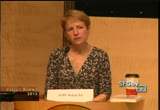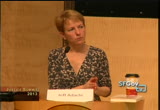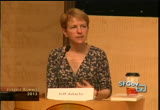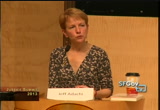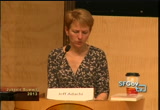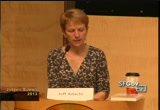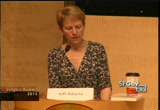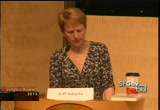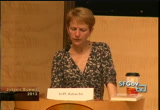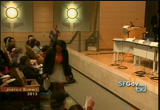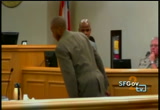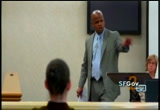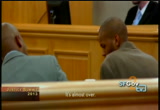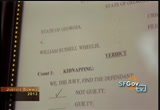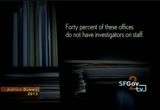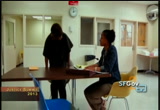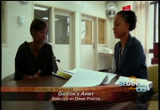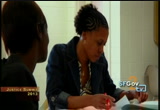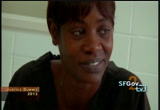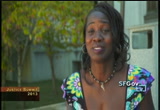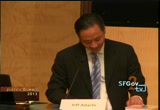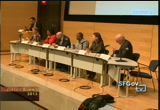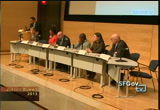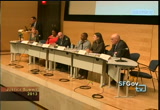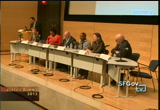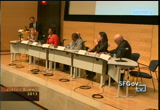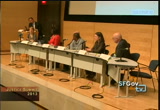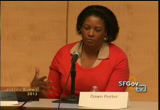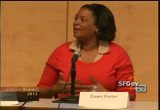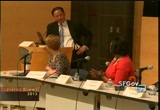tv [untitled] April 16, 2013 1:00am-1:30am PDT
1:00 am
people are attacking this from every angle. but i do think that one critical aspect is generateing the political will for the reform. when the politicians some law & order politician goes on and on with this lock em up mentality and people nod their heads. if people are better educated about these issues they will call the people on the carpet and say wait a minute. i think the mission, if i can give you that, would be to step outside your circle, your work circle and bring this issue to the broader public so they can create a change in the culture and the public's response to these issues that will then enable the politicians and legislators to make the reforms to the finances and the court's
1:01 am
etc that really need to happen and one way i think is a good way to do that and i'm talking, i'm a journalist, an advocacy journalist, it's usually said with a sneer but i wear the badge proudly, to reach out to reporter's because of course they do have that soapbox to share these stories with. so reach out to reporter's in your local newspapers, crime reporter's, whoever, and just invite them to spend the day with you. invite them to spend a day looking at just a day in your life as a public defender, a day in the life of you as a parole officer, whatever it is. and it's a tradition journalist use a lot with cops. we do a police ride along. invite them
1:02 am
to do a ride along to step in your shoes and walk in your shoes for a while and really again try to again get the stories that you see everyday out there to the general public. so that's your mission for this year should you choose to accept it. and then i just wanted kind of, you know, in that mode, and that's part of the way i wrote this book to was to look at getting real people's stories and again j ramon, the public defender in georgia was great because they let me follow a trial for a week and a half in georgia and it was great to bring to the public what it was like to be involved in a capital murder trial. a guy who
1:03 am
was falsely imprisoned for 20 years. he was a very eloquent storyteller himself. i'm going to read a short passage about him. today bright 56 six on the porch in new orleans 7th ward and rest on the head of his yellow dog. it's 2012 and he often finds himself amusing over time lost, time wasted. it feels like a minute that i have been out here. it took time to adjust to life on the outside and once on the a dark rainy morning as he found himself biking to his miserable job in mississippi he felt real despair. from recognized he was
1:04 am
47 years old and never had a car and afford for 20 years in prison. sometimes he says it's little things like that that can drag him down into sorrow. he chose to do something that both keep those wasted years fresh in his memory. he helps to educate others in the hopes that his story will spur reform. he's not an educated man. his formal schooling stopped in 6th grade. the katrina criminal justice reform effort. that's the holistic reentry program for offenders.
1:05 am
he told anybody with time to spare and inclination to listen. putting a face on an abstract idea, injustice. on this particular afternoon in may 2012, he tells this story to me for a fourth time. he is deeply preoccupied with a judge who denied his case for years. who also heard his murder case in 1976. the month he was released the judge died. greg goes to his house to get his tattered obituary he's read many times. the obituary says nice things. the judge may have been a goodman, greg muses, he might have been a good husband, father, great friend to many people, but people maybe saying the same thing about me. cue,
1:06 am
the dog. lifts his head to look around as if considering the matter then he lowers his head to rest his muzzle on greg's shoe. but because i'm a little guy, you step on my head and crush me. i don't even have god on my side. the old boys network that got him a lawyer but when friendly with a judge didn't even work of a sweat when it came to his case. it was a double murder trial that didn't last a couple hours. a flawed defense system rendered that almost meaningless. why? he says, you know why? sometimes i think about it. he wonders what the solutions are to the criminal justice system
1:07 am
here. to the black community, he talks on and on, indignant but right. mostly he wonders how change happens. sometimes i think about what is it, this mahatma gandhi thing. he cracks your head and you say thank you. he cracks your head again. you have to be animal when you do that. it's an outrage. he pauses and collects himself. i'm not talking from bitterness. he says this and yet how can you let go of bitterness. like a dog licking a wound keeping it open and raw greg bright revisits his past
1:08 am
wonders if it's a happy ending because he lives in a yellow house, my pot of gold at the end of a rainbow after finally receiving $190,000 in rest tuition. unending that could go either way. thank you. [ applause ] >> thank you very much. before we kickoff the first panel we have a special treat for you. we are lucky enough to have the
1:09 am
1:10 am
>> the judge is going to tell you that the state fails to prove their case. it is your duty, you must acquit. that's the beauty of this system. it's set up to give people the presumption of innocence. to give them an opportunity to not just be heard, but hold the state accountable. you want to take my liberty, you've got to do it right, if you don't acquit. the 5th amendment to the united states constitution guarantees it. as i have made my objection throughout this trial to make sure this kid gets a fair trial. it's not a big case is what they say. they are saying it. they have the gaul to say this is not a big case. there are few consequences. this boy will become a convicted fell
1:12 am
>> i have been advised -- the superior court, we the jury find the defendant not guilty. this 2nd day of november 2011. count 1. >> my goal is to fill this wall up and once i fill this wall up, i won't know what else to do. i decided the wall -- i don't have any tattoos. i'm going to get the last name of every case
1:13 am
i lost. hopefully i won't fill my back up. since this is going on the wall, i feel it has to go on my back. >> when you work as a public defender, you saved somebody and they are like what does that mean? i defend people who are charged with people committing crime. they say how can you defend people? i say it's about the sanctity of human liberty and the cost if you want to take it.
1:14 am
>> most important is trying to keep their moral up and try to keep their best interest at heart. i know for me when i relate to my clients i see them as cousins or brothers or uncles just because it's the face of the black community. so many of them are locked up and of course i'm having to work against their initial impression of public defender because their public defender somehow screwed them. >> how are you? >> good. >> sit over here. how are you? >> good. >> it's freezing outside. >> you know why i'm here. i'm
1:15 am
trying to get a better understanding of the place where you were arrested. let's kind of go through your information. >> what do you do? >> i'm certified mechanic. >> how long have you been a mechanic? >> about 15 years. >> okay. so once you are released and you go back, you will go back to working on cars? >> i will try. since i have been here, i have lost my house and they have broken in and stolen all of my tools. i have to start from scratch. my landlord found out. i have a conviction notice. >> where is all your stuff?
1:16 am
>> my mom said she went to get it the other day but the door was locked. i had court and i told 3 guards here that i had to go to court. nobody took me to court. that caused me to be evicted from my house. she called the court to let them know i was incarcerated. he's holding my stuff. >> thank you for letting me know that. >> you were convicted of cocaine possession? >> yes i did. i really planned to get out of jail. i have never been in jail before. it was my public defender. she
1:17 am
told me i would not be convicted. they told me i had another one and i thought my life was completely over. >> your sentence was two years suspended. you should have been eligible for readjudication. it's not the end of the world. >> it is the end of my world because i missed a lot. >> i'm going to ask about the eye-witnesses and where were they standing. could they have been under the influence because it could have been something that clouded their vision of what took place. all right? i will see you on monday. thank you so much.
1:18 am
>> your welcome. >> hey! how have you been? >> great. >> oh my gosh! what are you up to? >> i'm great. i'm glad i met her. if i didn't have you on my case i would still be locked up. i think i actually would have served those years they were trying to give me. i'm glad i had you to fight for me. i can see there is an honest person in the system. i kind of got mixed up in it and how, i don't know. i'm glad and they actually had people that care about people behind bars. i'm more aware of my freedom taking
1:19 am
it for granted. i'm free and loving life. [ applause ] >> i would like to ask our first panel to come up and take their seats. >> i'm going to start on my right to your left here and introduce karen hooper, the author of chasing gideon and i just want to announce that she will be holding a book signing.
1:20 am
the book came out yesterday. she will have a book signing during lunch. next is don porter, the producer of gideon's army. the clip we just saw. don is a founder of trilogy films and director of gideon's army. it premiered in the 2010 sundance festival. she's an a -- she's on the 2012 hot shot directors emerging to watch, she's also graduated from georgetown university law center and practicing attorney and abc
1:21 am
television networks before starting her television career and next is john. i met john about 10 years ago when he was starting off and had this crazy idea of operating a training center for public defenders and he did. he's no now the president and founder and one of the contributors to gideon's army, he's from john marshall law school where he teaches law and criminal procedure. he was in the post katrina and new orleans center. he trained people in the film. he received an advocacy fellowship and named a public interest fellow
1:22 am
by harvard law school. next we have maurice call well. he was convicted in the housing project here in san francisco. there was no physical evidence linking him to the crime yet he was still convicted based on the false testimony of a single neighbor. he was sentence to life behind bars. in prison mr. colwell contacted the center for help and located two witnesses who saw the murder and said mr. colwell was not involved in anyway. they located the real killer who confessed and he committed the murder. that man is serving a life sentence for a subsequent murder . on march 28, 2011 after more than 20 years in prison, maurice colwell is free. thank you for being here.
1:23 am
[ applause ] linda star is the legal and cofounding in the santa clara law, law center clerk received her ph.d.. she wrote and argued post conviction matters in state and federal court and supervisor in the sex crimes unit. she worked as a staff attorney in the 56 appellate court and now works on appeals. from a prosecutor to now an defender. welcome. >> now we have a senior partner, named one of the top trial lawyers in the united states. he's a lion of the trial bar. i have known him for
1:24 am
many many years. probably the most suspected trial lawyer. he's practiced for over 50 years. not to make you feel old and has done both civil and trial work and tried 140 cases including many many high profile cases and recognized as 2012 lifetime achiever by the american lawyer. welcome to our panel. i'm going to start with don since we just watched the clip. what made you want to make the movie? >> i was a civil litigate or but working in television at the time in a and e television network and i wasn't enjoying what i was seeing on television and interested in making my own film and lech son who you saw
1:25 am
on the first clip, i went to her with some documentary ideas and she said, you know, we don't like any of those ideas you have but you ought to meet john. so i met john rapping and he invited me to go to alabama as his training center and i just couldn't believe what i saw. i think being a lawyer, i was a litigate or, i didn't know anyone who was desperate to stay in the profession and desperate to do a good job and all the lawyers were this great energetic talking about justice and constitution and i thought that was a good story. so that's what happened. >> what was the story that you were trying to capture and how do you tell a story to a public that doesn't understand what public defenders do? >> you know, i really wasn't
1:26 am
thinking about the public. i was thinking about me as a person. i was thinking, i'm not a bad person and i just didn't know. i agree with karen that people are moved by individual stories. i filmed for over three-and-a-half years. i went to each of the training sessions. gideon's promise they get together every six months. i went to all of those and in between those trips i went to visit the individual lawyers. i thought if i can show people what their -- because i kept wanting to answer the questions why could anybody do this job. i wanted to turn that around and say how can you represent that people from the perspective of the people doing
1:27 am
the work and what was motivating them and i thought it was to tell it through their eyes and show why they get so emotionally invested. the thing i would say is when you make a film, it can be very lonely you are by yourself with an editor and doing what you think you should do. so seeing with an audience what has been the most gratifying is people are rooting for the clients and in every screening somebody will stand up and say, it's young people and they will say, at sundance this kid stood up and he said i'm a public defender and people said yay! and that doesn't usually happens. the reaction is getting this idea
1:28 am
of why someone would want to do this job and young people say they want to show this to their parents and say this is what i'm doing and this is why it's important to me. >> the media person, don, why do you think so little is known about public defenders. i don't know if you know the history in california, we have had public defenders office established in 1914, the first woman attorney. she had to sue to become a lawyer in california. she became a defense attorney and spent 20 years advocating for it and it finally passed in 1920. how do public defenders contribute to their anonymity. >> i'm not surprised it was a woman. but i think that much like me, the population that is
1:29 am
served by public defender lawyers is so invisible without a lot of political power, but you add to that, public defenders, i'm going to grossly generalized, so here i go, as a group, wrap, i think in a zelous representation, they tend to be not as open to the public and media. it's very hard to trust that somebody will represent your story well. i really encourage you to do what karen does which is let people see what you do. trust them to tell the story because they will see it. they see it in this film which every time i see it i think it doesn't go far enough, i didn't show enough, i didn't do it and people are moved by the story of people fighting for people. everybody reacts and responds to
53 Views
IN COLLECTIONS
SFGTV2: San Francisco Government Television Television Archive
Television Archive  Television Archive News Search Service
Television Archive News Search Service 
Uploaded by TV Archive on

 Live Music Archive
Live Music Archive Librivox Free Audio
Librivox Free Audio Metropolitan Museum
Metropolitan Museum Cleveland Museum of Art
Cleveland Museum of Art Internet Arcade
Internet Arcade Console Living Room
Console Living Room Books to Borrow
Books to Borrow Open Library
Open Library TV News
TV News Understanding 9/11
Understanding 9/11